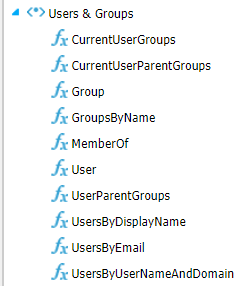Overview
You use user and group functions to retrieve information on users and groups.
Available functions
The Expression Wizard includes the following user and groups functions:

Retrieve data on groups
| To retrieve.... | Use expression... | Returns... |
|---|---|---|
| All the groups to which the user belongs | CurrentUserGroups(rt) | GroupView list |
| All the parent groups to which the user that executes the expression belongs | CurrentUserParentGroups(rt, <level>) | GroupView list |
| Group information by group ID | Group(rt, <groupId>) | GroupView |
| A list of all the existing groups | GroupsByName(rt, <groupName>) | GroupView list |
| All groups to which a user belongs | MemberOf(rt, <userId>) | GroupView list |
| Data on users by user ID and organization structure level | UserParentGroups(rt, <userId>, <level>) | GroupView list |
Retrieve data on users
| To retrieve.... | Use expression... | Returns... |
|---|---|---|
| Data on user by providing a user ID | User(rt, <userId>) | UserView |
| Data on user by providing the display name | UsersByDisplayName(rt, <displayName>) | UserView list |
| Data on user by email | UsersByEmail(rt, <email>) | UserView list |
| Data on a specific user by user name and domain name | UsersByUserNameAndDomain(rt, <userName>, <domainName>) | UserView list |
| Data on a number of users | {DataModel1}.Query("USPEXAMPLE", new Object[] {1,100,1,null,null}).Select(User(rt, Field("fldId"))) | UserView list |
